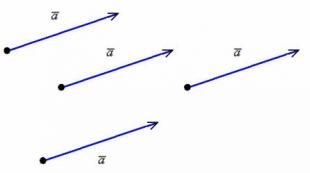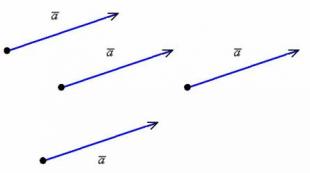Irritation - suppress or live? Irritation How to help a child
At work or among the immediate environment there is a person who causes irritation. He didn't touch you with a finger, but he's terribly infuriated. The manner of speaking or something special in behavior. A familiar picture? Let's look for reasons and understand.
Let's start with the fact that irritation is an unpleasant and, worse, harmful condition. Therefore, do not look for an excuse when you once again experience a painful reaction to someone else. It's not about being in a bad mood or Mercury retrograde.
“Everything that irritates in others can lead to self-understanding,” said Jung. And he was certainly right. Other people are mirrors to us. If a person hurts you, then this is a great reason to consider new information about yourself. Well, for example, you were assured in childhood that it was bad to “stick out” once again. You grew up timid and suppressed your own sense of activity and initiative. Think about who annoys you now? Upstarts, activists, initiators and people with ambitions, right? Irritation does not occur in a vacuum. This is always our reaction to what we unconsciously forbid ourselves. We or our parents. Our repressed feelings are most often manifested through irritation. And they can be anything, be it anger or shame.
Why do we always notice any little things in others, but do not know how to look at ourselves from the outside? This is due to the imaginary image of oneself loved and, of course, ideal in every way. This is characteristic even of insecure and quiet personalities (a paradox, but they are in the first place). They sincerely believe that anyone is to blame, but not themselves. People by nature do not want to delve into their shortcomings, let alone be aware of them. But the psyche is arranged in such a way that the more we don’t like something in ourselves, the more we don’t accept it and project it onto others.
It’s more convenient to get angry with your neighbor Vasya than with yourself. And why is he always smiling? Here's the bad guy!
Another reason why incomprehensible irritation appears is envy. You don’t want to admit it at all, do you agree? And then, instead of admitting that we are trivially jealous of a lucky friend, we begin to get angry at her. We take her sociability for fawning over others, and her mobility and ease of climbing for recklessness and frivolity. Or, for example, we can easily deceive ourselves in our desires: to engage in creativity, considering it to be something sublime, but in reality we want money and more mundane activities. We are afraid to admit to ourselves our own motives, thinking in stereotypical thinking or justifying other people's expectations.
There is another reason why we lose our temper, and this is our inability to work with our boundaries. They agreed to do something at work, for a relative or friend through force, they were terribly tired. And that's it. The process of irritation in relation to the "culprit" is launched. Still, you were forced to do something that you absolutely did not want to. The skill of saying “no” will help here, so as not to suffer in the future and not to suppress yourself. Borders are our home and our security. They need to be protected and defended, and if it doesn’t work out, try and introduce new behavioral techniques into the habit.
Unfortunately, irritation may not be a situational reaction, but a personal, established trait. It is characteristic of negative, self-centered and ill-mannered people. Here it is no longer a matter of mirroring, but of a banal disrespect for the interlocutor, the inability to listen and react with restraint.
And we turn to our favorite question: what to do?
First you need to admit to yourself that another source of irritation in the face of anyone is not to blame for anything and does not wish you harm. It really works and frees us from negativity. The ideal option is to keep a diary, where you will describe in detail what specifically made you angry in the other person and what you should have done in your opinion. In this way, you will pull out feelings and emotions that may have tormented you for a long time. In addition, think about whether you yourself have seen boasting or hypocrisy. Just be completely honest with yourself. Having found the cause of hostility, you will feel how the irritation will go away, and you will forget about it. If you accept your own shortcomings, then instantly “allow” others to have them. And yes, calm down. After all, it’s better to be calm, albeit imperfect, isn’t it?
There are two consonant concepts - irritability and irritation. These are terms related to the same science, but differing in their meaning. Although they are directly related. However, about everything - in order.
Terminology
So irritation is action. Which turns out to be various forms and manifestations on the body, its cells, tissues and organs. Those, in turn, are called irritants. According to their classification and characteristics, they differ, but more on that later.
Irritability, in turn, is the body's ability to respond to certain influences coming from the environment. It is expressed in a change in physico-chemical parameters. That is, irritability is a consequence of irritation. And this is a universal manifestation of the vital activity of each biological system without exception. Its presence is the norm. This is what distinguishes the living from the inanimate. And, by the way, the phenomena of irritability in animals and plants are similar. Let the forms of manifestation differ.
Excitability
This term is directly related to the topic under discussion, so it is impossible not to note its attention. Excitability is the ability of a living organism to respond to a stimulus. This is, in fact, the process of generating a nerve impulse. And excitation is a complex of processes of response to the action exerted by the stimulus. All of them are manifested in a change in metabolism and
Excitable tissues (muscle, nerve and glandular) are distinguished by their ability to conduct excitation. It is most pronounced in the nerves, which is logical. Also skeletal muscles.

Cause of all reactions
As mentioned earlier, irritation is an action. Which turns out to be on us all the time, albeit imperceptibly. These lines, read by a person, visually irritate him. As such, they are irritants.
This term refers to any factor of the internal or external environment that affects living tissue. But there is a classification, and a detailed one.
Irritants are primarily divided by nature. They can be:
- Physical. This is what surrounds us everywhere: sound, light, electricity, etc.
- Chemical. Acids, salts, hormones, alkalis ... even substances that enter the body with food. In order for them to assimilate, complex metabolic and splitting processes are carried out for them. Accordingly, the notorious substances have a certain irritation on the body, since it does this.
- Physical and chemical. It's a little more complicated here. This class includes the osmotic and partial pressure of gases.
- Biological. In short, this category includes everything that we take inside (water, food) and the people around us (parents, friends, lovers).
- Social. Yes, conversations, speech, words, communications - all these are also irritants.

Force of influence
It is impossible not to say about such a thing as the threshold of irritation. This is physiology, and every aspect is interconnected. The classification of influences according to the nature of origin was mentioned above. So, there is also a division of stimuli according to strength. But in order to understand what it is about, you need to know about the notorious threshold of influence. In simple terms, this is the minimum force exerted on the body by an irritant, which is sufficient to cause excitation. Of course, fresh bread, right under the nose of a person, has a pronounced aroma, but even a subtle smell stretching from a bakery from a neighboring street is enough to activate.
So, stimuli can be subthreshold. That is, not to cause any response. Their strength is too weak for that. Thresholds are the golden mean. Irritants of minimal strength (as in the case of a bakery), causing arousal. And the third category is superthreshold influences. Those whose strength is above the threshold (shown in the example of bread).

How does it work?
Well, irritation is physiology, and everything that concerns it proceeds in accordance with certain laws. And this case is no exception.
There is such a thing as reobase. It denotes the minimum force possessed by an irritant that causes excitation over a long time period. Which is not limited.
This is where the concept of useful time comes from. This is the minimum period during which the stimulus, which has the power of one reobase, affects the body. In simple terms, the time that is enough for the emergence of excitement.
And the last, third component is chronaxia. This term is used to denote the minimum time period during which an irritant having the strength of two rheobases has an effect on the body. The conclusion follows: the shorter the chronaxia or useful time, the higher the excitability will be. On the contrary, this principle also works.

Turning to psychology
Well, it was said above about what a physiological strong irritation is. This is a more or less clear topic. Now you can pay attention to the psychological aspect.
Everyone knows that irritation is a feeling. Which a person experiences when he is affected by an unpleasant person, action or phenomenon. In general, anything. But most importantly, it is necessarily connected with the personal perception of a person. Suppose a man is not going to get married. He wants to do business, because he sees himself in the business field, it brings him pleasure and joy. But his entire large family is firmly convinced that he needs to find a lover, get married and “twist a nest”. And no one is embarrassed to regularly remind him of this in an obsessive form. Accordingly, an emotion of irritation arises in his soul. It is natural. Which entails, as a rule, a sharp response. Which is quite understandable.

Special cases
It is worth noting one more nuance. Irritation is a concept in psychology that has another meaning. It often means a tendency to inadequate reactions to quite ordinary processes and phenomena. True, it is more correct to call it irritability. Which is explained by psychologists as folded aggression.
People deal with this in different ways. And it is necessary to fight this, because irritability spoils life. How can a person who is "brought to a boil" by the aroma of a colleague's perfume, a friend's minute lateness to a meeting and the laughter of other people be happy? But it does happen. In people with increased irritability, the world, as a rule, exists in black colors.
Well, in this case, you need to try to take everything under control and start resolving the problem. Since the accumulated irritation does not bode well.
Focal lesions of the cerebral cortex can lead to partial seizures in a variant of Jacksonian epilepsy. In connection with local irritation of the cortex, the onset of convulsions from a limited muscle group is typical with preserved consciousness. The seizure may be limited to this, but it can generalize, turning into a general convulsive seizure with loss of consciousness. For topical diagnosis of the localization of cortical lesions, the initial symptom of a seizure, indicating the location of local irritation of the cortex, is of primary importance. The characteristic types of seizures are described below.
Rolandova region
- Irritation of the precentral gyrus leads to seizures that begin with convulsions in a separate muscle group, which can spread to the entire limb and wider - in accordance with the somatosensory projection of the body in the precentral gyrus.
- Irritation of the postcentral gyrus causes seizures of sensitive Jacksonian epilepsy, which begin with paresthesia in the zone corresponding to the lesion. Irritation may radiate along the postcentral gyrus, which leads to the spread of paresthesia to half of the body, and may also affect the precentral gyrus, which manifests itself in convulsions.
Frontal share
- Irritation of the posterior part of the middle frontal gyrus leads to the appearance of a seizure, which begins with a convulsive turn of the head and eyes in the opposite direction to the focus, followed by a generalization of the seizure.
- Irritation of the zone of the frontal tire (operculum frontale), which is located downward from the central sulcus, causes seizures that begin with rhythmic movements resembling smacking, swallowing, champing, chewing. Seizures may be generalized.
- Irritation of the anterior adversive field (posterior superior frontal gyrus) leads to a seizure, which begins with convulsions of the entire opposite musculature of the body at once. Consciousness is lost at the onset of the seizure.
- Non-convulsive epileptic seizures in case of damage to the frontal lobes are manifested by turning off consciousness for a very short time (units or fractions of seconds), accompanied, as a rule, by a temporary cessation of actions, speech, etc.
– Attacks of frontal automatism continue for a longer time (minutes and hours). During the attack, the patient can perform complex actions that seem expedient to others. Quite often, socially dangerous actions (murders, arson) can be committed during such attacks. It is necessary to take into account the blackout of consciousness during the attack and the amnesia of the actions performed.
temporal share
- Irritation of the temporal lobe in the region of the superior temporal gyrus leads to seizures that begin in the auditory aura. With irritation of the inner surface of the temporal lobe (uncus gyri parahippocampalis), the aura can be olfactory. Foci of irritation in the region of the insular lobe lead to the appearance of a taste aura. A rarer vestibular aura occurs when the parietal-occipital-temporal junction is irritated. Visceral auras (cardiac, epigastric) are possible with irritation of the mediobasal regions.
- A feature of seizures of temporal lobe epilepsy is the relatively rare development of a generalized convulsive seizure and the more frequent development of partial seizures in the form of a short-term loss or blackout of consciousness without convulsions; the emergence of dream-like states with a feeling of what has already been seen, or when everything around seems unreal, unreal.
Parietal share. Irritation of the posterior adversive field (upper parietal lobule) causes a seizure that begins with paresthesia immediately in the entire opposite half of the body. This is followed by either convulsions in the muscles of the opposite side of the body, or a secondarily generalized convulsive seizure.
Occipital share. Irritation of the occipital lobe leads to seizures that begin with a visual aura (photomas and more complex visual images), often followed by a turning of the head and eyes in the opposite direction and a general convulsive seizure.
Irritability is a symptom that very often occurs with fatigue. They complement each other and manifest themselves from the wrong organization of working time and rest. When a person does not have normal free time, other things accumulate during the rest, then chronic fatigue and irritability gradually appear. That is why doctors convincingly recommend that all people correctly allocate time for work and rest.
Etiology
Increased irritability is formed on the basis of. The causes of the manifestation of a symptom can also serve as an exacerbation of chronic ailments, physically, lack of sleep, failure in the daily routine. If a person succumbs to irritability, then his hormonal background begins to change and immunity decreases.
Clinicians have determined that the causes of irritability are internal and external.
Internal provoking factors include such diseases:
- anxious feeling;
- feeling of hunger;
- stress after injury;
- severe fatigue;
- alcohol and drug abuse;
- inability to express oneself;
- brain dysfunction.
Doctors refer to external factors as causes associated with the external environment that cause discontent. The wrong actions of people, traffic jams, cataclysms or other annoying things can provoke a symptom.
The reasons fall into three more categories:
- physiological - often diagnosed in the female before menstruation, when the hormonal background changes, they can also occur during pregnancy, menopause, thyroid disease. Nervousness and irritability in women can progress from a feeling of hunger, a lack of vitamins and trace elements, and the use of drugs;
- psychological - typical for the manifestation of lack of sleep, fatigue, anxiety, fear, stress, dependence on nicotine, alcohol or drugs;
- genetic - excessive impact on the nervous system. Irritability is not a symptom, but a character trait.
Constant irritability can be a sign of such pathologies - mental illness.

If irritability manifests itself along with, then most likely the problem lies in somatic diseases, lack of vitamins, pregnancy or hormonal disruptions when menstruation begins.
Also, the symptom often manifests itself without any objective reasons. As a rule, in adults, this phenomenon is associated with somatic disorders or internal experiences. Under such circumstances, irritation is formed in people with mental disabilities. The group of such individuals includes those who cannot accept the realities of the world, agree to certain rules and cope with social problems. In such cases, people are diagnosed with a "mental disorder", and from time to time irritability, aggression, anger or other manifestations may appear.
It was previously mentioned that irritability often appears in women when hormonal levels fail. However, this symptom is increasingly formed in men. This is not surprising, since the male body secretes many hormones that can decrease or increase.
During the period of testosterone deficiency, the stronger sex manifests abnormal, aggression and irritability. The formation of the symptom may be associated with the fear of developing impotence.
The symptom can also occur in young children from two years of age. The causes of irritability can be such factors:
- psychological;
- physiological;
- genetic.
Irritability can also appear as a symptom of severe pathologies - perinatal encephalopathy, allergies, infections, food intolerance, psychiatric ailments.
Symptoms
Irritability in men and women is manifested in increased excitability and the formation of negative emotions in relation to minor provoking factors. Any little thing can cause a person to have an attack of anger and irritability. In order to be able to distinguish this symptom and know how to prevent it, the patient needs to understand in what symptomatology it manifests itself.
When a person is irritable:
- the intonation and volume of the conversation changes;
- movements are sharper;
- accelerates the movement of the eyeballs;
- the oral cavity is dehydrated;
- palms sweat;
- breathing becomes too fast.
Sometimes there may be a desire to get rid of all your emotions, or in psychology this process is called “throw out negative emotions”. If you do not do yourself an emotional discharge, then flashes of anger, neurosis and other negative reactions may periodically appear. Such signs inform a person about a mental disorder, and force the patient to turn to.
When irritability appears, men complain of fatigue and depression. But the female body, with outbreaks of hormonal disorders, provokes such signs - mood changes, conflict, anxiety, anxiety.
Treatment
An increasing number of people are interested in the question of how to get rid of irritability. In the modern world, this issue is very relevant, since the number of external provoking factors has increased and people are much more susceptible to them. In this regard, doctors offer different ways to deal with irritability.
For all patients, clinicians have derived general rules of behavior when irritability is detected:
- alternate work;
- engage in physical and mental stress consistently;
- when working at home, you can do cleaning or cooking, and for office employees you can go for a walk outside;
- drink the daily norm of water;
- get enough sleep;
- ventilate the room;
- eat healthy food.
Considering the question of how to deal with irritability, it may seem that there is nothing difficult in this. However, many people who have a symptom provoked by external stimuli have difficulty in adequately eliminating the symptom. Quite often, people try to relieve stress with nicotine and alcohol, but this is completely wrong. Using these drugs can only aggravate the situation, damage the brain and other cells and tissues of the body.
Also, doctors do not advise to cope with the disease by drinking strong coffee and tea. They lead only to a temporary effect of activity, and then fatigue and aggressiveness return with a new intensity.
Psychologists advise all patients to cope with bouts of irritability in simple ways:
- do not focus only on negative emotions;
- to express their troubles to relatives and friends;
- restrain outbursts of anger, do not show them to loved ones;
- learn to yield in different situations;
- set realistic goals;
- do more sports and walk outside;
- engage in auto-training;
- get enough sleep;
- with frequent manifestations of irritability and fatigue, a short vacation is needed.
In the treatment of a symptom, medical methods can be used. Medicines are prescribed to the patient with severe irritability and the development of mental ailments.
In fact, each of us would like to avoid friction in relationships with loved ones. Remain calm, balanced, and not piss each other off with caustic remarks or outbursts of anger. And therefore the ability to manage conflicts, even minor ones, is a useful skill.
Coach Kira Asatryan insists that there are times when making your partner angry is good for a relationship. Let's look at situations where a little annoyance doesn't hurt a couple.
1. Irritation is a sign that you are comfortable with each other.
When we first start dating someone, we try to be the best we can be, especially if the person is attracted to us. We refrain from certain activities that our partner may not like, such as not lounging in front of the TV all weekend with a bag of chips and eating our favorite spaghetti straight from the pan.
But sooner or later, the real "I" begins to get out and somehow strains the partner. A typical example is Harry walking naked around Charlotte's apartment, which causes her bewilderment, and then anxiety (Sex and the City series). In a way, Charlotte's annoyance is a sign that she and Harry are in a real, deep relationship.
“The manifestation of the true “I” with all its habits and oddities means that you are calm and comfortable with each other,” explains the coach. "When you start bickering and butting heads, it means you no longer feel the need to always say the 'right' things, and that's a testament to the sincerity and strength of the relationship."
2. But it's also a sign that you're not too comfortable.
Anxiety should not be caused by quarrels and minor frictions, but by your emotional self-elimination. If you or your partner have reached the stage of complete indifference and each other's actions do not cause emotions - neither joy, nor irritation or disappointment - this is a sign that you are out of the game.
The task is not to get rid of frustration, but to recognize the true meaning of irritation.
“Of course, it is not worth provoking too sharp conflicts,” the expert clarifies. - But the absence of any emotional outbursts for the relationship can be even worse. If you feel anxiety next to your partner, it means that you still feel something ... Would you really like to stop feeling at all? In short, negative emotions can be a sign that there is still life in a relationship!”
3. Find opportunities for development in annoyance
Of course, not every manifestation of irritation should be searched for a high meaning. The fact that a partner is regularly late for dinner or forgets to wash the car may not mean anything special. But still, in many situations, much more often than we realize, actions that cause rejection serve an important purpose. Friction zones sometimes highlight the differences of partners, but can highlight problems in a relationship. It happens that irritation indicates those aspects of life together that need to be improved.
How do you know what partners need to work on? “Pay attention to what pisses you off,” the coach explains. - There may be a serious reason behind regular delays. And the forgetfulness of a partner indicates his irresponsibility, which can cause anxiety in a serious relationship.
So, in my opinion, the task is not to get rid of frustration, but to recognize the true meaning of irritation: it indicates that you do not play any role in the relationship, but remain yourself. About how you can still feel and the relationship could be better, it just needs to be worked on.”
about the author
Kira Asatryan- Coach, relationship specialist, author of Stop Being Lonely: Three Simple Steps to Developing Close Friendships and Deep Relationships, New World Library, 2016.









